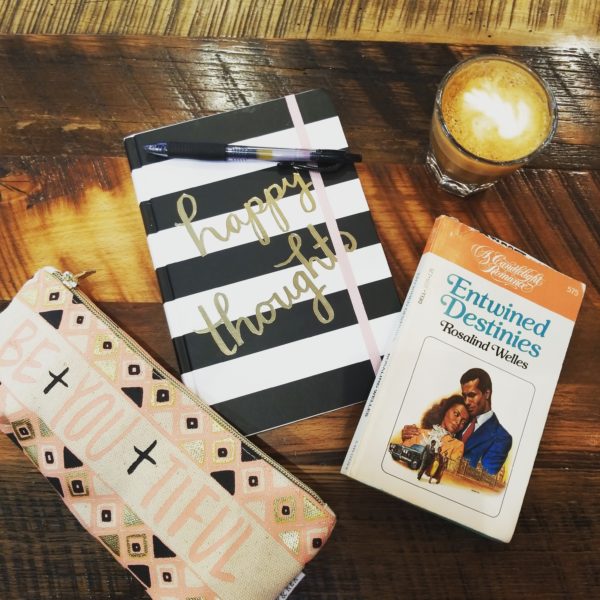Entwined Destinies by Rosalind Welles is definitely the first category romance written by a black woman about a black couple, but it may even be the first romance written by a black woman about a black couple. Welles was a pen name for Elsie B. Washington, a journalist who wrote for Newsweek and also had a few nonfiction releases. It’s worth noting that her editor, Vivian Stephens, founder of RWA, and longtime editor for Dell and Harlequin, is also black. I don’t know about the cover artist. It’s signed “Iskowitz”–possibly artist Joel Iskowitz–so probably not. The book was published under the Dell Candlelight line, #575. I have long loved this line and its sexier younger sister, Dell Candlelight Ecstasy, for as long as I’ve been interested in vintage romance. It tends to be a little less regressive than similarly-aged Harlequins for one thing. So I was super tickled when contemporary and erotic romance author Melissa Blue mentioned this book on Twitter.
The book itself is to some degree a product of its time. The couple spends quite a bit of time apart and is filled with an over-abundance of detail about the heroine’s job as a journalist for fictional Upbeat Magazine. On the surface it is quite remarkably similar to the Harlequin Presents of the period–more similar than it is to the Dell Candlelights of the same period. The naive young heroine, orphaned, with an elderly relative, moves to a new city (DC to London) in pursuit of a promising job opportunity and meets an older, experienced, suave hero, who is wealthy and resistant to the love offered by the heroine. There is also an evil other woman, a suitor who serves as an ingratiating foil to the cool, arrogant hero, and a cast of other characters. Plus the book is told in third person from the heroine’s perspective and the hero is pretty much as opaque as concrete until the closing pages.
However, Entwined Destinies is different in a number of important ways. The biggest and most important is obviously that the hero and heroine are both black. There are also several other black characters including the heroine’s aunt (Kathleen, named after the author’s mother, which is delightful), the evil other woman, the hero’s foil, one of the heroine’s coworkers (a Jamaican immigrant to the UK) and her boyfriend. The story also features the overlap between the heroine’s job as a journalist and the hero’s as an oil executive–the oil industry of the fictional African nation of Dagombi. What results is a story immersed in blackness in a way that had never previously occurred in romance, which alone is enough to guarantee Entwined Destinies a valuable spot in romance history.
That’s not the full extent of what makes the book so interesting though. What struck me, as a connoisseur of vintage romance, is how the book worked within the accepted standards of the genre on the surface, but tweaked its nose in other ways. For one thing, it passes the Bechdel test, a relatively rarity even in romance today much less nearly 40 years ago.The heroine and her coworkers routinely discuss the stories they are working on at the magazine in addition to talking about boys. For another, even while there is no sex in the book, it’s got really great sexual tension. There are lingering looks and little brushes throughout the book. But my favorite was one scene where the hero runs the heroine a warm basin of water after she gets drenched by cold, London rain. And then he washes and dries her feet before kissing her.
Finally, the hero also loses his temper and in a fit of passion, comes very close to raping the heroine, a very commonplace occurrence in old school romance designed to showcase the hero’s virility and passionate desire for the heroine without labelling the heroine the kind of girl who accepts pre-marital advances. This is obviously out-dated and unnecessary in modern romance. But Entwined Destinies rightfully treats the hero’s actions as the black moment of the story. The heroine does get over it and they get their HEA, which might not work for modern readers, but it is notable, even unprecedented, for a hero to admit wrongdoing in this context and offer both flowers and apologies for his actions. I’ve never seen anything like it in an older book. It’s a total repudiation of the “rape equals love” construct that drives many sexual encounters in vintage books.
On a personal note, I loved the author’s descriptions of life in London. The heroine lives in Marylebone, which is where I lived when I lived in London. It is also a historically black neighborhood, though not so much any more. The hero of Wanted, A Gentleman by KJ Charles lives in Marylebone in 1805 and mentions that this was the case. It’s also fiction of course, but Charles is a fiend for historical detail so I’m quite sure it’s accurate. Seeing the names of parks I visited and streets I walked as an American living in London just completely tickled me. Washington must have visited because she got every detail just so exactly right.
Sadly, Entwined Destinies is long out of print. The Dell Candlelight edition from 1980 is quite difficult to find and the 1994 reprint from Genesis Press nearly equally so. At present, there is no ebook and no clear indication of who own the rights. Maybe someday we’ll be able to get this classic into digital so more people can read it. The first black couple in a romance by a black woman deserves that at the very least.


